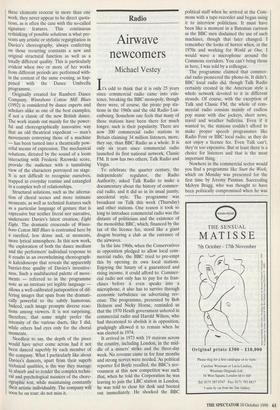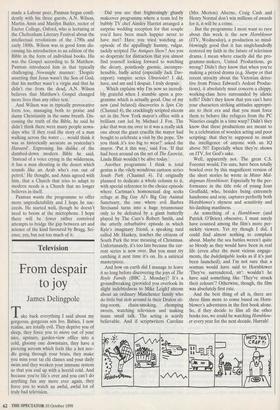Radio
Airwave newcomers
Michael Vestey
It's odd to think that it is only 25 years since commercial radio came into exis- tence, breaking the BBC monopoly, though there were, of course, the pirate pop sta- tions in the 1960s and the old Radio Lux- embourg. Somehow one feels that many of these stations have been there for much longer, such is their popularity. There are now 200 commercial radio stations in Britain claiming 34 million listeners, more, they say, than BBC Radio as a whole. It is only six years since commercial radio launched its first national network, Classic FM. It now has two others, Talk Radio and Virgin.
To celebrate the quarter century, the independents' regulator, the Radio Authority, asked Talk Radio to make a documentary about the history of commer- cial radio, and it did so in its usual jaunty, anecdotal style. The programme was broadcast on Talk this week (Thursday) and other stations. One reason it took so long to introduce commercial radio was the distaste of politicians and the existence of the monolithic BBC, which, financed by the tax of the licence fee, stood like a giant dragon bearing a club at the entrance of the airwaves.
In the late 1960s, when the Conservatives in opposition pledged to allow local com- mercial radio, the BBC tried to pre-empt this by opening its own local stations. Enjoying the luxury of a guaranteed and rising income, it could afford to. Commer- cial radio not only has to pay for its fran- chises before it even speaks into a microphone, it also has to survive through economic turbulence on advertising rev- enue. The programme, presented by Bob Holness and Nicicy Home, reminded us that the 1970 Heath government ushered in commercial radio and Harold Wilson, who had threatened to abolish it in opposition, grudgingly allowed it to remain when he was elected in 1974.
It arrived in 1973 with 19 stations across the country, including London, in the mid- dle of a miners' strike and the three-day week. No revenue came in for four months and strong nerves were needed. As political reporter Ed Boyle recalled, the BBC's ner- vousness at this new competitor was such that, when he told the Corporation he was leaving to join the LBC station in London, he was told to clear his desk and booted out immediately. He shocked the BBC political staff when he arrived at the Com- mons with a tape-recorder and began using it to interview politicians. It must have been like a moment in a Bateman cartoon as the BBC men disdained the use of such machines, though that later changed. I remember the looks of horror when, in the 1970s and working for World at One, I would wave a microphone around the Commons corridors. You can't bring those in here, I was told by a colleague.
The programme claimed that commer- cial radio pioneered the phone-in. It didn't. BBC local radio did, though Talk Radio certainly created in the American style a whole network devoted to it in different strands. Of course, with the exception of Talk and Classic FM, the whole of com- mercial radio consists mainly of endless pop music with disc jockeys, short news, travel and weather bulletins. Even if it wanted to, the stations couldn't afford to make proper speech programmes like Radio Four or BBC local radio, as they do not enjoy a licence fee. Even Talk can't, they're too expensive. But at least there is a choice for listeners and that is the most important thing.
Nowhere in the commercial sector would you find a programme like Start the Week, which on Monday was presented for the first time by Jeremy Paxman. Succeeding Melvyn Bragg, who was thought to have been politically compromised when he was made a Labour peer, Paxman began confi- dently with his three guests, A.N. Wilson, Martin Amis and Marilyn Butler, rector of Exeter College, Oxford, who is lecturing at the Cheltenham Literary Festival about the intellectual revolutions of the 1790s and early 1800s. Wilson was in good form dis- cussing his introduction to an edition of the Bible in the form of individual books. His was the Gospel according to St Matthew. Paxman introduced him in that typically challenging Newsnight manner: 'Despite asserting that Jesus wasn't the Son of God, that his mother wasn't a virgin and that he didn't rise from the dead, A.N. Wilson believes that Matthew's Gospel changed more lives than any other text.'
And Wilson was in typically provocative form too, managing both to praise and damn Christianity in the same breath. Dis- cussing the truth of the Bible, he said he didn't think there were many people nowa- days who 'if they read the story of a man walking across the water. . . would think it was as historically accurate as yesterday's Hansard'. Expressing his dislike of the dumbed-down modern Bible he said, 'Instead of a voice crying in the wilderness, it has a man shouting in the desert which sounds like an Arab who's run out of petrol.' He thought, and Amis agreed with him, that a Church that tries to adapt to modern needs is a Church that no longer believes in itself.
Paxman wants the programme to offer more unpredictability and I hope he suc- ceeds. He started well, though he doesn't need to boom at the microphone. I hope there will be fewer rather contrived attempts to bridge the gap between art and science of the kind favoured by Bragg. Sci- ence, yes, but not too much of it.











































































 Previous page
Previous page